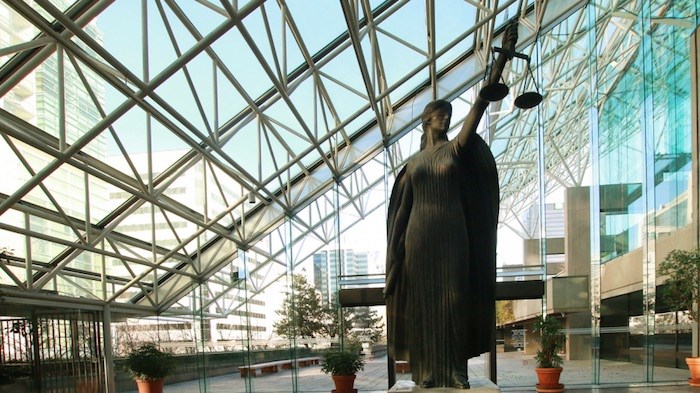A B.C. group representing single mothers is waiting for a B.C. Supreme Court judge to decide if they can sue the province for better access to legal aid.
The Single Mothers' Alliance (SMA) filed a court application in February alleging an agreement between the province and the Legal Service Society (now Legal Aid BC) impedes access to justice in family law proceedings.
The alliance is being represented by West Coast Leaf, whose executive director says eligibility requirements are problematic because single mothers must earn about $29,000 for a two-person household to qualify for legal aid.
Raji Mangat says that means many working mothers must represent themselves in what is essentially a "broken" system, leaving some retraumatized because they could be cross-examined by a former partner's lawyer.
That lack of access, the alliance claims, affects protection of women and children from family violence, hampers guardianship and custody cases and harms parent-child bonds.
The group asserts it violates their charter rights to security of the person and causes severe psychological stress. They further claim the situation violates their constitutional rights to access to the courts.
In order to have the case heard, the group first had to apply for what is known as standing, a legal recognition of their right to bring the case.
Arguments on that issue were heard this week; the judge is now looking over submissions, including those from the provincial government, which opposes the group having standing.
In its Feb. 17 response to the case, the province said the alliance is not the appropriate group to bring the action to court and should be denied standing. The province argued in its response the alliance had not produced any documentation assessing the impact of legal aid issues in its members.
“The province says the SMA lacks the capacity to bring the claim because it is incapable of providing ‘concrete information’ about the core factual issues in the claim,” the province’s response said.
“The Single Mothers’ Alliance has heard from lone mothers that they are harmed by not being able to adequately access B.C.’s family law courts,” said alliance executive director Viveca Ellis. “Funding cuts, restrictive eligibility criteria out of touch with reality, and one size-fits-all legal aid services have harmed generations of low-income mothers and children who needed assistance and support when they were most at risk.”
Ellis said the group "will never back down."
“These women and mothers deserve their day in court,” she said.
Alliance board member Mai Eaglespeaker said the lack of access to legal aid for low-income mothers and their children escaping gender-based family violence puts the health, well-being and survival of some of B.C.’s most marginalized women and children at risk.
"The province of B.C. has failed these women and children when they are most at risk and require legal representation, access to justice, protection and safety,” she said.
West Coast Leaf believes the court should grant the alliance standing.
“By attacking the standing of Single Mothers’ Alliance, the B.C. government would like to shut the courtroom doors to our client before the trial even begins,” Kate Feeney, West Coast Leaf director of litigation.
“Rather than confronting the reality of a broken family law legal aid system, this government expects people fleeing violence to carry the enormous financial burden and emotional trauma of a constitutional challenge all on their own," Feeney said.
Ongoing legal aid issues
Access to legal aid has been an issue of contention for decades.
After a 2011 probe into the state of B.C.’s legal aid system, lawyer Len Doust said the system should be an essential service with stable government funding.
Doust said the system needed “targeted strategies to meet the needs of under-served communities, including Indigenous communities, women leaving abusive relationships, individuals with mental or cognitive disabilities, migrant workers and the elderly.
The situation was revisited in 2019 with a report by lawyer Jamie Maclaren to the attorney general.
“Women suffer disproportionately from inadequate access to family legal services,” Maclaren wrote.
“In January 2018, LSS confirmed that approximately 70 per cent of family legal aid applications are made by women; however, 55 per cent of all family legal aid applications are refused.
“Access to family legal aid is clearly an equality issue,” he said.
With a file from Canadian Press

